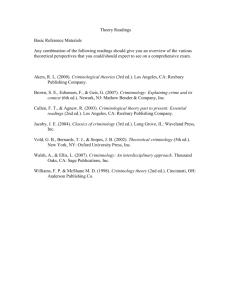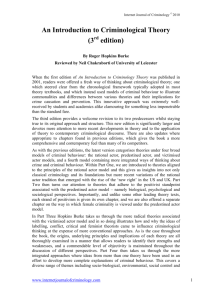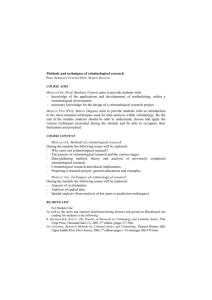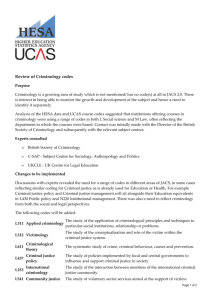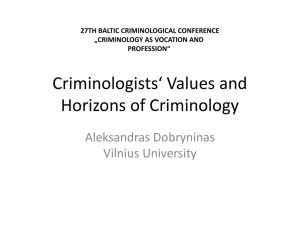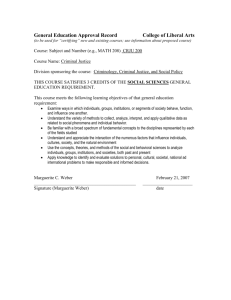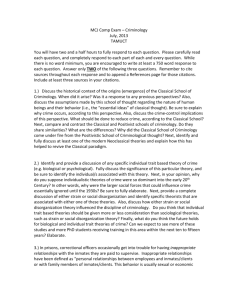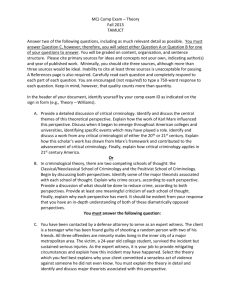as PDF - Unit Guide
advertisement
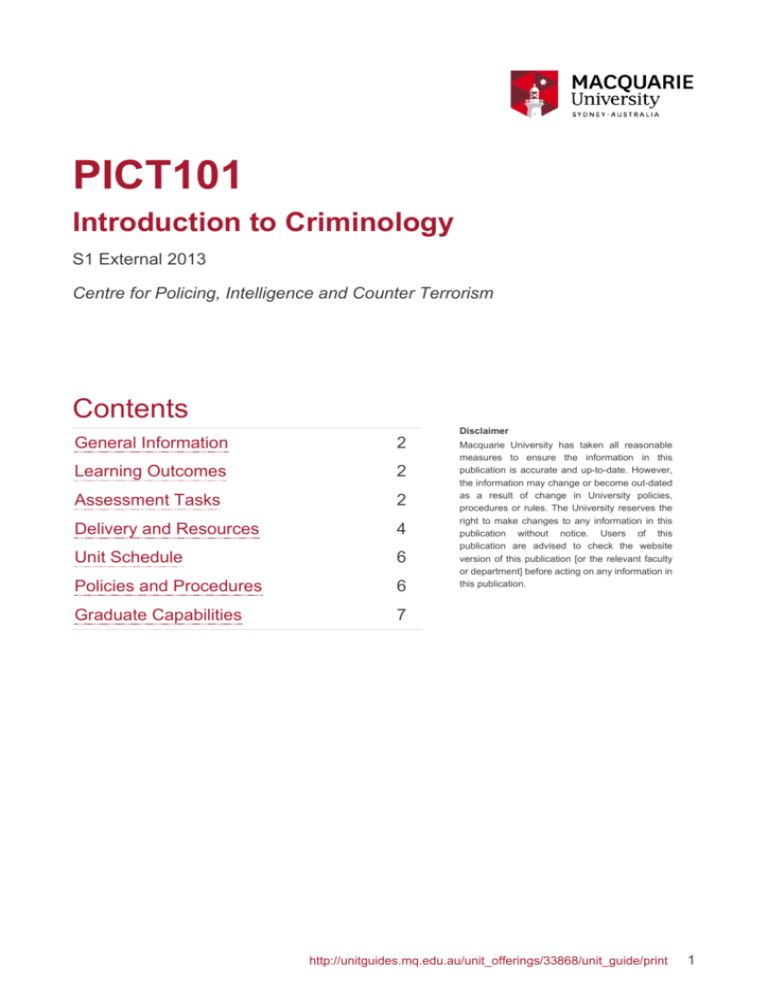
PICT101 Introduction to Criminology S1 External 2013 Centre for Policing, Intelligence and Counter Terrorism Contents General Information 2 Learning Outcomes 2 Assessment Tasks 2 Delivery and Resources 4 Unit Schedule 6 Policies and Procedures 6 Graduate Capabilities 7 Disclaimer Macquarie University has taken all reasonable measures to ensure the information in this publication is accurate and up-to-date. However, the information may change or become out-dated as a result of change in University policies, procedures or rules. The University reserves the right to make changes to any information in this publication without notice. Users of this publication are advised to check the website version of this publication [or the relevant faculty or department] before acting on any information in this publication. http://unitguides.mq.edu.au/unit_offerings/33868/unit_guide/print 1 Unit guide PICT101 Introduction to Criminology General Information Unit convenor and teaching staff Unit Convenor James Martin james.martin@mq.edu.au Contact via james.martin@mq.edu.au Credit points 3 Prerequisites Corequisites Co-badged status Unit description This unit aims to introduce students to the theory and practice of Criminology. It will explore definitions of crime, theories of crime and criminality and contemporary issues in criminology. With reference to relevant research and theory the unit aims to give students an appreciation of three broad areas, what is crime? who is a criminal? and the application of contemporary theory to contemporary social issues. Learning Outcomes 1. Identify and distinguish between major criminological theories, e.g. strain theory, differential association, biological positivism; 2. Research and locate different academic sources and express judgement about their validity; 3. Engage in informed criminological discussion with criminology staff and other students; 4. Analyse and demonstrate critical understanding of major criminological theories with regard to particular types of criminal offence. Assessment Tasks Name Weighting Due Tutorial/online participation 10% Throughout semester Online Quiz - Mid-Semester 10% Monday 15/4 http://unitguides.mq.edu.au/unit_offerings/33868/unit_guide/print 2 Unit guide PICT101 Introduction to Criminology Name Weighting Due Online Quiz - End of Semester 10% Friday 7/6 Annotated Bibliography 20% Monday 18/3 Research Essay Plan 10% Monday 29/4 Research Essay 40% Monday 3/6 Tutorial/online participation Due: Throughout semester Weighting: 10% This Assessment Task relates to the following Learning Outcomes: • Engage in informed criminological discussion with criminology staff and other students; Online Quiz - Mid-Semester Due: Monday 15/4 Weighting: 10% This Assessment Task relates to the following Learning Outcomes: • Identify and distinguish between major criminological theories, e.g. strain theory, differential association, biological positivism; Online Quiz - End of Semester Due: Friday 7/6 Weighting: 10% This Assessment Task relates to the following Learning Outcomes: • Identify and distinguish between major criminological theories, e.g. strain theory, differential association, biological positivism; Annotated Bibliography Due: Monday 18/3 Weighting: 20% This Assessment Task relates to the following Learning Outcomes: • Research and locate different academic sources and express judgement about their validity; http://unitguides.mq.edu.au/unit_offerings/33868/unit_guide/print 3 Unit guide PICT101 Introduction to Criminology Research Essay Plan Due: Monday 29/4 Weighting: 10% This Assessment Task relates to the following Learning Outcomes: • Analyse and demonstrate critical understanding of major criminological theories with regard to particular types of criminal offence. Research Essay Due: Monday 3/6 Weighting: 40% This Assessment Task relates to the following Learning Outcomes: • Identify and distinguish between major criminological theories, e.g. strain theory, differential association, biological positivism; • Research and locate different academic sources and express judgement about their validity; • Analyse and demonstrate critical understanding of major criminological theories with regard to particular types of criminal offence. Delivery and Resources UNIT REQUIREMENTS AND EXPECTATIONS • You should spend an average of at least 9 hours per week on this unit. This includes listening to pre-recorded lectures prior to tutorial discussions and reading weekly required readings detailed in iLearn. • Internal students are expected to actively participate in tutorials. This involves appropriate preparation before class (i.e. listening to online lecture content and completing required weekly readings). Students should provide relevant document (e.g. a medical certificate) if they miss a tutorial. • External students are required to contribute to on-line discussions. Further information regarding online discussion requirements are available on iLearn. REQUIRED READINGS • The citations for all the required readings for this unit are available to enrolled students students through the unit iLearn site and at Macquarie University's Library EReserve site. Electronic copies of required readings may be accessed at the EReserve site. http://unitguides.mq.edu.au/unit_offerings/33868/unit_guide/print 4 Unit guide PICT101 Introduction to Criminology • The core text for this unit is Marmo, M, De Lint, W, and Palmer, D (2012) Crime and Justice: A Guide to Criminology, 4th edition, Thomson Reuters. This text is available in the University bookshop. RECOMMENDED READINGS • Recommended readings will be posted to the unit iLearn site as Session 1 progresses. TECHNOLOGY USED AND REQUIRED • Personal PC and internet access are essential for this unit. Basic computer skills and skills in word processing are also a requirement. • The unit can only be accessed by enrolled students online through http://ilearn.mq.edu.au SUBMITTING ASSESSMENT TASKS • All assessment tasks are to be submitted, marked and returned electronically. This will only happen through the unit iLearn site. • Assessment tasks must be submitted as a MS word document by the due date. • All assessment tasks will be subject to a 'TurnitIn' review as an automatic part of the submission process. • Assessment tasks must be submitted with as assessment coversheet incorporating a plagiarism declaration. A copy of the coversheet can be downloaded at: http://www.arts.mq.edu.au/current_students/undergraduate/coversheet • The granting of extensions of up to one week are at the discretion of the unit convenor and tutorial staff. Any requests for extensions must be made in writing before the due date for the submission of the assessment task. Extensions beyond one week are subject to special consideration. The policy for this is detailed under Policy and Procedures. LATE SUBMISSION OF ASSESSMENT TASKS All assignments which are received after the due date, and where no extension has been granted by the course convener or tutor, will incur a deduction of 5% for the first day, and 1% for each subsequent day including the day on which the work is received. Weekends and public holidays are included. SPECIAL CONSIDERATION Students who are prevented from completing any of the work required to complete this unit should report the circumstances via an Application for Special Consideration form to the Registrar's Office. This letter must be accompanied by a completed Professional Authority Form (http://www.student.mq.edu.au/ses/Special%20Consideration.html) or other proper evidence. http://unitguides.mq.edu.au/unit_offerings/33868/unit_guide/print 5 Unit guide PICT101 Introduction to Criminology Unit Schedule Module 1 - Introduction to criminology Module 2 - Measuring crime Module 3 - Crime in the news Module 4 - The criminal mind Module 5 - The criminal world Module 6 - Serious assault and homicide Module 7 - Youth crimes Module 8 - Gender and crime Module 9 - Race and crime Module 10 - Illicit drugs and crime Module 11 - Gangs and gangster Module 12 - Crimes of the powerful Policies and Procedures Macquarie University policies and procedures are accessible from Policy Central. Students should be aware of the following policies in particular with regard to Learning and Teaching: Academic Honesty Policy http://www.mq.edu.au/policy/docs/academic_honesty/policy.html Assessment Policy http://www.mq.edu.au/policy/docs/assessment/policy.html Grading Policy http://www.mq.edu.au/policy/docs/grading/policy.html Grade Appeal Policy http://www.mq.edu.au/policy/docs/gradeappeal/policy.html Grievance Management Policy http://mq.edu.au/policy/docs/grievance_management/policy.html Special Consideration Policy http://www.mq.edu.au/policy/docs/special_consideration/policy.html In addition, a number of other policies can be found in the Learning and Teaching Category of Policy Central. Student Support Macquarie University provides a range of Academic Student Support Services. Details of these services can be accessed at: http://students.mq.edu.au/support/ UniWISE provides: • Online learning resources and academic skills workshops http://www.students.mq.edu.au/support/learning_skills/ • Personal assistance with your learning & study related questions. http://unitguides.mq.edu.au/unit_offerings/33868/unit_guide/print 6 Unit guide PICT101 Introduction to Criminology • The Learning Help Desk is located in the Library foyer (level 2). • Online and on-campus orientation events run by Mentors@Macquarie. Student Enquiry Service Details of these services can be accessed at http://www.student.mq.edu.au/ses/. Equity Support Students with a disability are encouraged to contact the Disability Service who can provide appropriate help with any issues that arise during their studies. IT Help If you wish to receive IT help, we would be glad to assist you at http://informatics.mq.edu.au/ help/. When using the university's IT, you must adhere to the Acceptable Use Policy. The policy applies to all who connect to the MQ network including students and it outlines what can be done. Graduate Capabilities Problem Solving and Research Capability Our graduates should be capable of researching; of analysing, and interpreting and assessing data and information in various forms; of drawing connections across fields of knowledge; and they should be able to relate their knowledge to complex situations at work or in the world, in order to diagnose and solve problems. We want them to have the confidence to take the initiative in doing so, within an awareness of their own limitations. This graduate capability is supported by: Learning outcomes • Research and locate different academic sources and express judgement about their validity; • Analyse and demonstrate critical understanding of major criminological theories with regard to particular types of criminal offence. Assessment tasks • Annotated Bibliography • Research Essay Plan • Research Essay Effective Communication We want to develop in our students the ability to communicate and convey their views in forms effective with different audiences. We want our graduates to take with them the capability to read, listen, question, gather and evaluate information resources in a variety of formats, assess, http://unitguides.mq.edu.au/unit_offerings/33868/unit_guide/print 7 Unit guide PICT101 Introduction to Criminology write clearly, speak effectively, and to use visual communication and communication technologies as appropriate. This graduate capability is supported by: Learning outcomes • Identify and distinguish between major criminological theories, e.g. strain theory, differential association, biological positivism; • Research and locate different academic sources and express judgement about their validity; • Engage in informed criminological discussion with criminology staff and other students; • Analyse and demonstrate critical understanding of major criminological theories with regard to particular types of criminal offence. Assessment tasks • Annotated Bibliography • Research Essay Plan • Research Essay Capable of Professional and Personal Judgement and Initiative We want our graduates to have emotional intelligence and sound interpersonal skills and to demonstrate discernment and common sense in their professional and personal judgement. They will exercise initiative as needed. They will be capable of risk assessment, and be able to handle ambiguity and complexity, enabling them to be adaptable in diverse and changing environments. This graduate capability is supported by: Learning outcomes • Identify and distinguish between major criminological theories, e.g. strain theory, differential association, biological positivism; • Research and locate different academic sources and express judgement about their validity; • Engage in informed criminological discussion with criminology staff and other students; • Analyse and demonstrate critical understanding of major criminological theories with regard to particular types of criminal offence. Assessment tasks • Annotated Bibliography • Research Essay Plan • Research Essay http://unitguides.mq.edu.au/unit_offerings/33868/unit_guide/print 8 Unit guide PICT101 Introduction to Criminology Discipline Specific Knowledge and Skills Our graduates will take with them the intellectual development, depth and breadth of knowledge, scholarly understanding, and specific subject content in their chosen fields to make them competent and confident in their subject or profession. They will be able to demonstrate, where relevant, professional technical competence and meet professional standards. They will be able to articulate the structure of knowledge of their discipline, be able to adapt discipline-specific knowledge to novel situations, and be able to contribute from their discipline to inter-disciplinary solutions to problems. This graduate capability is supported by: Learning outcomes • Identify and distinguish between major criminological theories, e.g. strain theory, differential association, biological positivism; • Research and locate different academic sources and express judgement about their validity; • Engage in informed criminological discussion with criminology staff and other students; • Analyse and demonstrate critical understanding of major criminological theories with regard to particular types of criminal offence. Assessment tasks • Online Quiz - Mid-Semester • Online Quiz - End of Semester • Annotated Bibliography • Research Essay Plan • Research Essay Critical, Analytical and Integrative Thinking We want our graduates to be capable of reasoning, questioning and analysing, and to integrate and synthesise learning and knowledge from a range of sources and environments; to be able to critique constraints, assumptions and limitations; to be able to think independently and systemically in relation to scholarly activity, in the workplace, and in the world. We want them to have a level of scientific and information technology literacy. This graduate capability is supported by: Learning outcomes • Identify and distinguish between major criminological theories, e.g. strain theory, differential association, biological positivism; • Research and locate different academic sources and express judgement about their validity; http://unitguides.mq.edu.au/unit_offerings/33868/unit_guide/print 9 Unit guide PICT101 Introduction to Criminology • Engage in informed criminological discussion with criminology staff and other students; • Analyse and demonstrate critical understanding of major criminological theories with regard to particular types of criminal offence. Assessment tasks • Tutorial/online participation • Annotated Bibliography • Research Essay Plan • Research Essay Creative and Innovative Our graduates will also be capable of creative thinking and of creating knowledge. They will be imaginative and open to experience and capable of innovation at work and in the community. We want them to be engaged in applying their critical, creative thinking. This graduate capability is supported by: Learning outcomes • Research and locate different academic sources and express judgement about their validity; • Analyse and demonstrate critical understanding of major criminological theories with regard to particular types of criminal offence. Assessment task • Research Essay Engaged and Ethical Local and Global citizens As local citizens our graduates will be aware of indigenous perspectives and of the nation's historical context. They will be engaged with the challenges of contemporary society and with knowledge and ideas. We want our graduates to have respect for diversity, to be open-minded, sensitive to others and inclusive, and to be open to other cultures and perspectives: they should have a level of cultural literacy. Our graduates should be aware of disadvantage and social justice, and be willing to participate to help create a wiser and better society. This graduate capability is supported by: Learning outcomes • Engage in informed criminological discussion with criminology staff and other students; • Analyse and demonstrate critical understanding of major criminological theories with regard to particular types of criminal offence. http://unitguides.mq.edu.au/unit_offerings/33868/unit_guide/print 10 Unit guide PICT101 Introduction to Criminology Assessment tasks • Tutorial/online participation • Research Essay Plan • Research Essay Socially and Environmentally Active and Responsible We want our graduates to be aware of and have respect for self and others; to be able to work with others as a leader and a team player; to have a sense of connectedness with others and country; and to have a sense of mutual obligation. Our graduates should be informed and active participants in moving society towards sustainability. This graduate capability is supported by: Learning outcomes • Engage in informed criminological discussion with criminology staff and other students; • Analyse and demonstrate critical understanding of major criminological theories with regard to particular types of criminal offence. Assessment task • Research Essay Commitment to Continuous Learning Our graduates will have enquiring minds and a literate curiosity which will lead them to pursue knowledge for its own sake. They will continue to pursue learning in their careers and as they participate in the world. They will be capable of reflecting on their experiences and relationships with others and the environment, learning from them, and growing - personally, professionally and socially. This graduate capability is supported by: Learning outcomes • Research and locate different academic sources and express judgement about their validity; • Engage in informed criminological discussion with criminology staff and other students; • Analyse and demonstrate critical understanding of major criminological theories with regard to particular types of criminal offence. Assessment tasks • Research Essay Plan • Research Essay http://unitguides.mq.edu.au/unit_offerings/33868/unit_guide/print 11
